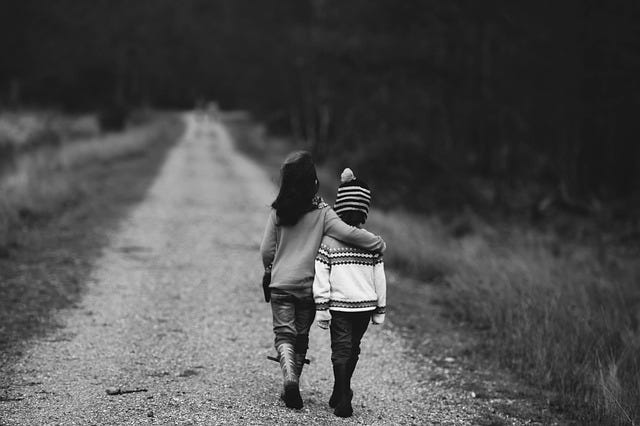The tenderness of long-lasting friendships
And how they sustain us in a hyperconnected yet fraught world
The best friendships are like pashmina shawls - warm, light and easy to drape - and just as amenable to be folded neatly and kept inside the cupboard for a bit, awaiting the next meeting. I am lucky to have many such friends who show up once in a while like a breath of fresh air and envelope me with affection, nostalgia and love. Several delightful catch-ups have happened in the last few months, and a few more are on the anvil.
What struck me in these meetings is that the more intense the friendship had been at its peak, however short that time period was, the higher my sense of comfort and connection in the present, regardless of the gap between meetings. The friendships forged during childhood and youth hold strong. If I was really into the person then, chances are I can instantly form a connection with them now.

I was surprised by how little social media mattered, save its role in maintaining connections over time and enabling the chats that led to the reunions themselves. These in-person interactions built on the embodied experiences of our shared past and were fuelled by genuine curiosity about our authentic lives outside of and beyond what we portray online. Social media helped build some context about location, the kind of work someone does, or what their family life is like, but in these meetings, I found we quickly worked through the broader context and even sometimes skipped it entirely. Something about that past closeness allowed us to enter quickly into conversations about loss, pain, struggle and fear.
This week, I met a friend who lives in the US and is working through the physical logistics and emotional challenges of caring for an ailing parent who lives in India. It mattered that I knew his mother, and that could I visualise his childhood home. That I had been there, as part of that set of childhood experiences, a part of the context where he drew his strongest memories of his own bond with her. So much could remain unsaid, so much could remain unexplained and unelaborated. The ability to leave things unsaid while being perfectly understood was so freeing.
Last month, I spent a precious half an hour between work appointments with a friend who I had first met when we were little kids but hadn’t seen for over a decade. We were together in school for only a couple years back in the mid 1980s. But such had been my attachment to her that I remember nearly bringing the house down when I realised that I may never see her again because we were relocating! A kind aunt had rescued my bewildered parents by volunteering to track down my friend’s address back in the day when all I knew was her name and where her dad worked, and eventually taking me all the way across Bombay to see her. In my then very middle-class family, this became a great story to illustrate how spoilt single children (yes, me!) are, but I will never forget the kindness of my aunt, who recognised my anguish and need for closure. To meet this friend now, to talk about life choices, marriage and politics, was to recognise the power of a bond forged when we could barely spell those words, leave alone understand them. To hold her hand and look into her eyes as we clicked that selfie was to condense into a single moment and a single frame immeasurable amounts of pain, joy, longing, relief and so much more.
Last night, I spoke to a friend who now lives in Australia. The tenderness of those hostel days in Delhi, when we held each others’ deepest secrets, lingered between us on that voice call. As it does each time we talk, which is only a couple of times a year. Over two hours, we talk about workplace experiences, family tensions and the confusing business of raising teenagers. After we had disconnected, she Whatsapped, “You know if our kids had ONE friend in their life like we have in each other, we wouldn’t worry as much.”
It isn’t possible to predict the future of our children’s present friendships. We worry because, in our childhood, we interacted over walks, outings, and long afternoons in each other’s homes and hostel rooms. Many Gen-Z friendships are forged online, a space that research increasingly associates with poor mental health. But I have considerable faith in the intelligence of the young. If we allow ourselves to recognise it, they have a great sense of responsibility and are unafraid of showing their vulnerability. Even as they play the social game of pretence, their patience for hypocrisy is next to zero. As we can see in the world around us, from protests over Israel’s genocide in Gaza to climate strikes, the young are showing us the mirror.
In my experience, a shared worldview, solid ethical framework and a capacity for empathy go further in nurturing friendships than innovations in communication technology. So fake online personas, bots and deep fakes notwithstanding, wherever time is spent, and honest conversations had, wherever confidences are shared and reciprocated, wherever comfort is offered and taken, pain recognised and eased, wherever honesty trumps pretence, and kindness and grace given a chance, I have hope for the power of friendship and human connection.




Such a resonant & affirmative write-up. I echo your worries, thoughts & hopes about kids
Loved this and brought to mind many such friendships/relationships